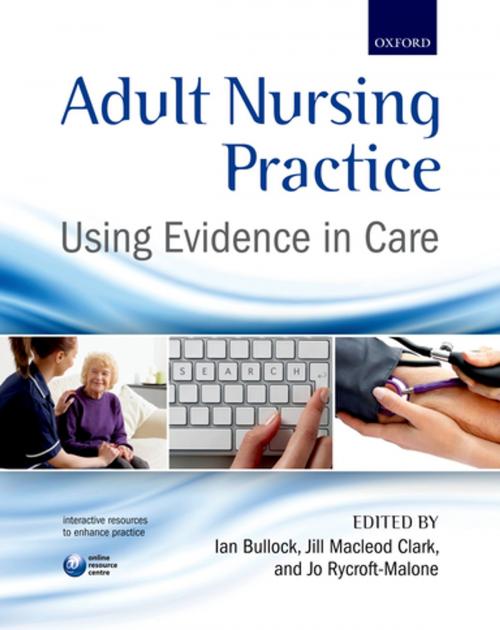Adult Nursing Practice
Using evidence in care
Nonfiction, Health & Well Being, Medical, Nursing, Management & Leadership| Author: | ISBN: | 9780191631184 | |
| Publisher: | OUP Oxford | Publication: | May 24, 2012 |
| Imprint: | OUP Oxford | Language: | English |
| Author: | |
| ISBN: | 9780191631184 |
| Publisher: | OUP Oxford |
| Publication: | May 24, 2012 |
| Imprint: | OUP Oxford |
| Language: | English |
Adult Nursing Practice: Using evidence in care enables today's students and newly qualified nurses develop the knowledge and skills they need to deliver, and lead care tomorrow. Reflecting the principles of evidence-based care in line with the current NMC competencies, this textbook helps students learn to manage patients with common conditions and fundamental health needs so they can provide the best possible evidence-based care. Written, and edited by leading nurses from practice, education and research, it focuses on common diseases, fundamental health needs, and symptoms that nurses' encounter in daily practice. Conditions are clearly explained so that the causes of ill health are easily understood. Every chapter covers pathophysiology, indicates the key priorities for nursing assessment, and discusses 'what the evidence says', before considering nursing management options. Throughout the authors' clear signposts to trustworthy evidence mean that students can effortlessly select the best nursing interventions for their patients using the current available evidence-base. The ideal guide for students preparing for registration and newly qualified staff going through preceptorship, it is packed with over 115 illustrations and lots of features to bring the subject to life and make learning easier: BLNursing assessment illustrations outline challenges caused by common diseases in a helpful and memorable way, highlighting issues that need assessment BLRed flag icons indicate the warning signs of deterioration and urgent questions are listed that can be used for assessment and monitoring BLCase studies of effective evidence-based interventions show the difference that high quality nursing care makes BLCross references between common conditions' causes and managing related health needs and symptoms develop understanding by clearly linking pathophysiology with nursing management options BLTheory into practice boxes further enhance learning through suggested activities, such as exploring key evidence, considering major practice issues or applying core knowledge while out on placement BLOnline resource centre at www.oxfordtextbooks.co.uk/orc/bullock /. Filled with interactive and useful e-learning resources to help students test their learning, keep up-to-date with the latest evidence and further expand their knowledge, it features: BLClinical decision making scenarios BLQuiz questions BLUpdates to content BLHyperlinked references BLimages from the book BLLecturer resources
Adult Nursing Practice: Using evidence in care enables today's students and newly qualified nurses develop the knowledge and skills they need to deliver, and lead care tomorrow. Reflecting the principles of evidence-based care in line with the current NMC competencies, this textbook helps students learn to manage patients with common conditions and fundamental health needs so they can provide the best possible evidence-based care. Written, and edited by leading nurses from practice, education and research, it focuses on common diseases, fundamental health needs, and symptoms that nurses' encounter in daily practice. Conditions are clearly explained so that the causes of ill health are easily understood. Every chapter covers pathophysiology, indicates the key priorities for nursing assessment, and discusses 'what the evidence says', before considering nursing management options. Throughout the authors' clear signposts to trustworthy evidence mean that students can effortlessly select the best nursing interventions for their patients using the current available evidence-base. The ideal guide for students preparing for registration and newly qualified staff going through preceptorship, it is packed with over 115 illustrations and lots of features to bring the subject to life and make learning easier: BLNursing assessment illustrations outline challenges caused by common diseases in a helpful and memorable way, highlighting issues that need assessment BLRed flag icons indicate the warning signs of deterioration and urgent questions are listed that can be used for assessment and monitoring BLCase studies of effective evidence-based interventions show the difference that high quality nursing care makes BLCross references between common conditions' causes and managing related health needs and symptoms develop understanding by clearly linking pathophysiology with nursing management options BLTheory into practice boxes further enhance learning through suggested activities, such as exploring key evidence, considering major practice issues or applying core knowledge while out on placement BLOnline resource centre at www.oxfordtextbooks.co.uk/orc/bullock /. Filled with interactive and useful e-learning resources to help students test their learning, keep up-to-date with the latest evidence and further expand their knowledge, it features: BLClinical decision making scenarios BLQuiz questions BLUpdates to content BLHyperlinked references BLimages from the book BLLecturer resources















